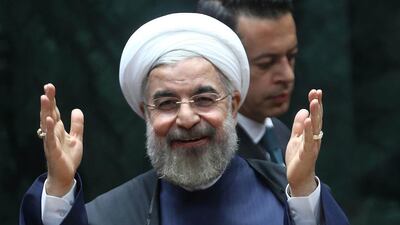ABU DHABI // Experts found some of the poll’s results surprising, particularly when it came to Iran’s nuclear agenda.
In 2012, 78 per cent of Arabs in the UAE said they believed Iran had ambitions to produce nuclear weapons. This year, that number plummeted to 53 per cent.
“It is quite surprising because the mood of the public is one of distrust of Iran and you’d assume that they would want to indict Iran as a wily negotiator who will hoodwink the P5+1 and proceed to produce nukes a la North Korea,” said Dr Albadr Alshateri, adjunct professor at the National Defence College and researcher at the Armed Forces.
“A possible explanation is, saying Iran will produce nuclear weapons is a recognition of its capability scientifically, [while] no Arab power has these capabilities. So maybe they want to deny Iran the prestige of a nuclear-capable status like that of Japan, Sweden and Brazil.”
Mark Katz, professor of government and politics at the School of Policy, Government and International Affairs at George Mason University in Washington, DC, said the surprising results could mean a substantial number of Arabs in the UAE were more convinced now that Tehran was genuinely seeking a nuclear agreement with the P5+1.
But although they have over time come to see Iran as less of a nuclear threat, they still see it as a threat, as 80 per cent said they believed Iran did not contribute to peace and stability in the Arab world.
“What this shows is that, unlike in the West and Israel where the focus is on a possible Iranian nuclear threat, Arabs in the UAE see Iran more threatening due to its support for its Shia allies in the region,” Mr Katz said.
Prof Abdulkhaleq Abdulla, political science professor at UAE University, said the results were not surprising.
“Nearly everybody perceives Iran as a force of instability in the region,” he said. “As a country that follows an expansionist policy, as a country that feels itself at ease interfering in regional affairs, this is definitely not contributing to the Arab world’s stability,” he said. “Wherever there are hot spots - Iraq, Yemen, Lebanon - we see Iran so I don’t think this will change in the near future as Iraq will remain troublesome and Iran will always want a weak Iraq next door. Syria will continue this way, Lebanon is also in trouble with the presence of Hezbollah and Yemen is now the new place to watch. It’s a pattern that will most likely continue.”
Dr Alshateri said people saw Iran as the problem and source of instability and conflict.
cmalek@thenational.ae

